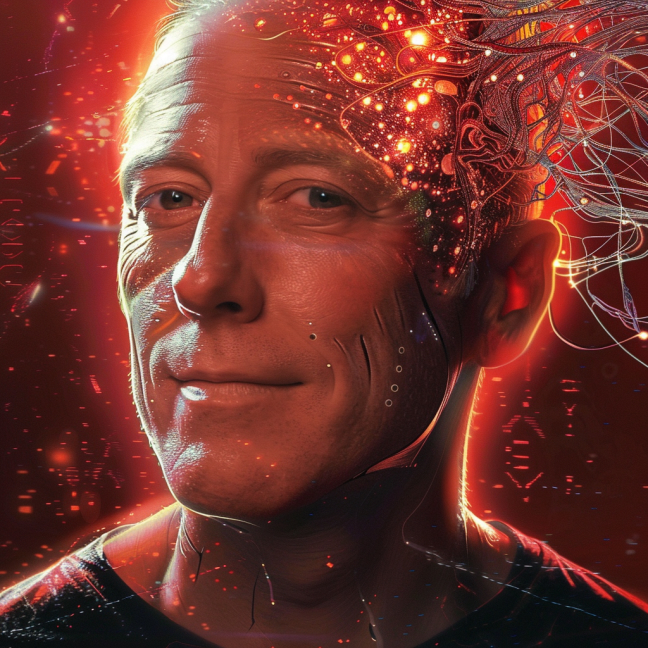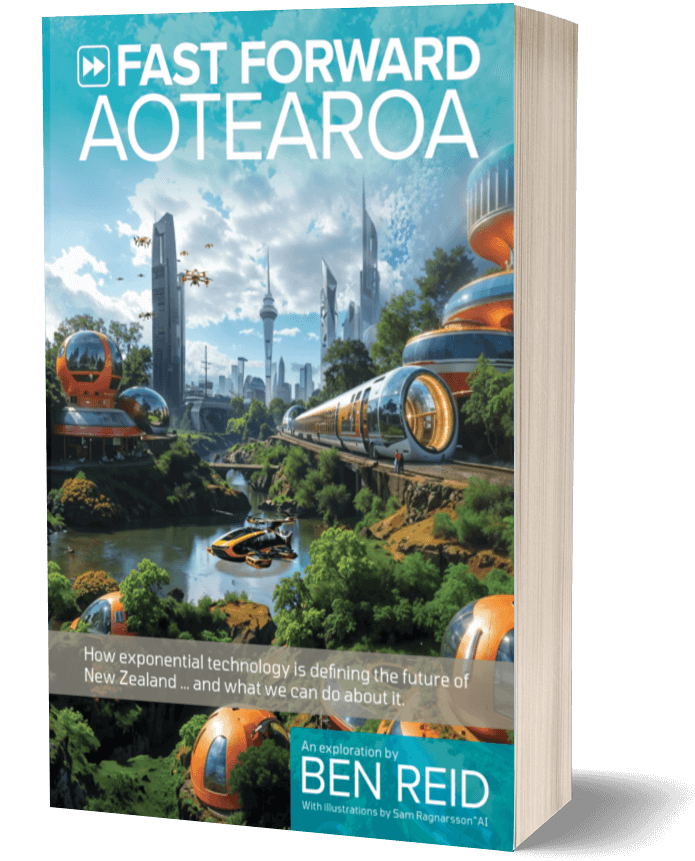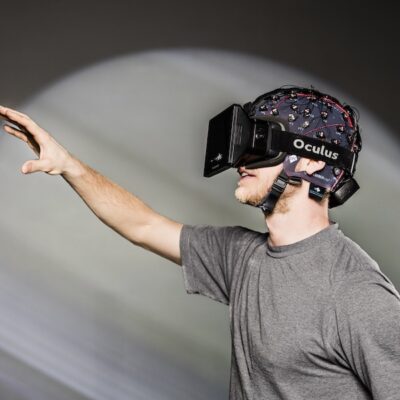Here comes the future, ready or not
In life, and business, emerging technologies centred on AI are set to have a profound impact on all of us. Technology futurist Ben Reid’s new book Fast Forward Aotearoa uncovers a whole new world of possibilities and opportunities.
For Ben Reid, technology and science fiction have always held a special fascination. Right from when he was a young teenager teaching himself to write code on his Apple IIe, he admits to always living “more in the future, less in the past”.
Ben’s career has mirrored the cutting edge of technology’s progress over the past three decades. He has been a software developer, architect, and consultant – and is now a technology futurist who ‘eats, sleeps and breathes’ emerging technologies and their impact on both business and the wider society.
In his long-running Memia weekly newsletter on Substack he scans the frontier of new technology, informing audiences worldwide on the potential impact of cutting-edge technologies such as artificial intelligence (AI).
“I’ve always been an innovator,” Ben explains. “And I’ve always been very interested in what’s happening at the very frontier of technological development.”
The sudden arrival, and rapid adoption of AI around the world, as well as other technologies such as virtual reality, robotics, nanotech, biological, and space exploration technologies, has caught many by surprise. However, it is AI that has arguably the most potential to impact and influence our lives.
For a new technology, AI’s rate of acceleration has amazed Ben. “Since late 2022 when ChatGPT first came out we’ve seen this relentless pace of new releases with improved functionality, new startups, and new AI models that are just way better than the previous generation only a few months old.”

Ben says the genesis for his book Fast Forward Aotearoa, published this month, was witnessing the speed at which AI and other emerging applied and general-purpose technologies were being adopted worldwide.
“I looked around New Zealand and saw how slow we were to respond to these technologies, and to adopt them in our economy,” he says. “As a country we also missed that AI investment opportunity five years ago. The country just didn’t see it coming.”
Although Kiwis have earned a narrative around Number 8 wire and punching above our weight, New Zealand is still in danger of becoming a technological backwater, fears Ben.
“This is particularly highlighted in the slow pace that we are absorbing new technologies into our mainstream economy, and into our government.”
Not surprisingly he wants to see large parts of government service delivery completely automated. “That’s what every other business on the planet is doing with their digital transformation programme, so why doesn’t the public sector? One thought experiment I’ve had is ‘what if you completely re-engineered government services using software and AI? What would it look like and how much would it cost?”
Uncertain times
Fast Forward Aotearoa basically translates what Ben is seeing happening at the forefront of global technology and putting it into a New Zealand context. He also sounds the alarm on increasing volatility and uncertainty around the planet. In Ben’s view there is a high probability that mainstream New Zealand is massively underestimating the impacts of climate change and geopolitical uncertainty.
“Also, we may not be in a unipolar1 world any more, but instead moving into a multipolar one with large states like China, India and others having a bigger impact on global affairs to rival the US,” he says. “New Zealand needs to start having conversations around how an independent foreign policy would actually operate in that multipolar scenario.”
In the book Ben talks about the ‘poly-crisis’ – the uncertain and volatile times we’re moving into. He doesn’t think Kiwis spend enough time imagining what their country’s future is really going to be like with all the change that is happening around the world.
Forward thinking
Fast Forward Aotearoa is a useful reference manual for businesses and individuals to get up to speed on 20 ‘exponential technologies’ which are defining the future we will live in. Ben says readers will find it easy to just dip into the book any time they want. A useful summary, as well as 840 footnotes throughout the book, will help them extract maximum knowledge.
“Business owners and managers will gain a clear view of what New Zealand’s future economy could look like,” explains Ben. “We have this history of primary sector-dominated exports and services for tourism which, to be frank, are the antithesis of carbon-negative economic activities. For me the big question is, what is that really valuable technology product that we can provide the world with instead in the future?
“What value is the world going to need in 10 to 15 years’ time that we can start laying the foundations for now, and deliver world-leading capability?”
While the book is forward thinking, it is also positive and includes an outline of a new technology strategy for the country.
“We’re missing a cohesive approach to investing in technology. In the book I discuss what a national technology strategy could look like. I also outline more than 100 technology solutions that would help us achieve it,” says Ben.
He makes no apology for calling out New Zealand’s consumption-based economy in his book, as well as the policy of “putting profits, financial wealth and GDP before anything else” pushed by both government and business.
“Why are we “hypnotised” by GDP to the point where we continue to sink all our investment in that space? Yes, we want to live more comfortable lives and be wealthier. But fundamentally we need a future where the planet’s biosphere is still functioning and able to support us.
“We also need a cohesive political system that isn’t driven by division,” suggests Ben. “The techno-optimist in me says that technology can fix this.”
The role of AI in economic growth
One of the questions Ben continues to ask himself centres around economic growth – is it truly good for business? Up until now, GDP growth has been tightly bound to growth in greenhouse gas emissions. Unless this can be fundamentally decoupled, he believes growth and GDP have lots of negative environmental effects, and wonders if businesses need to adjust their settings.
AI can help do that, he explains. It can help to measure and model carbon emissions and pollution and even help monitor the environment [think tracking and counting species such as dolphins, or perhaps wilding pines in forests].
AI can also be used to detect certain features within satellite imagery. It is accelerating scientific discovery with major AI-driven breakthroughs in biotechnology and materials science in the past year alone.
“Optimistically, in just a few years, we may be able to type in “GPT-7, solve climate change will you?” and in seconds it will just invent a new chemical process which sucks carbon dioxide out of the atmosphere at scale and fixes the problem overnight,” says Ben.
“I’d like to think this is likely, but until then hope is not a strategy and we need to do everything we can to achieve not just net-zero, but net-negative GHG emissions.”
Ben refers to the term AI as a “salad-bowl full of diverse concepts and techniques”, and, not surprisingly, one stunning application for the technology is reflected in Sam Ragnarsson’s AI-generated photo-realistic illustrations in the book. The cover image is a futuristic Auckland city skyline with hyper-modern passive housing, a sleek autonomous “bus-train” and the sky full of drones. But Ben’s favourite is the image of a mountainside town with no cars or roads, where he can see himself living in the future.
Driving productivity and efficiency
Research demonstrates that there are many productivity and efficiency gains to be had with AI. “Things that used to take me days to do, now just take me a minute,” says Ben.
Think summarising large documents or writing up a first draft of a research report on a particular topic, and many other tasks that used to involve a lot of ‘Googling’ and reading, he adds.
Ben has also found AI invaluable, and easily accessible, for translation work when partnering with exporters overseas. “I’d recommend using a paid subscription AI model if you can because they’re slightly higher quality than the free ones.”
Ben wants business owners to be curious, not dismissive, about AI.
Certainly, don’t be afraid of it, he says. “There’s no manual about how to use AI, you simply have to read up about it and learn by having an interactive conversation with it.
“In many ways, the whole compression of all human knowledge is in there.”
This article was originally published in the June 2024 issue of NZBusiness magazine. To read the issue, click here.







